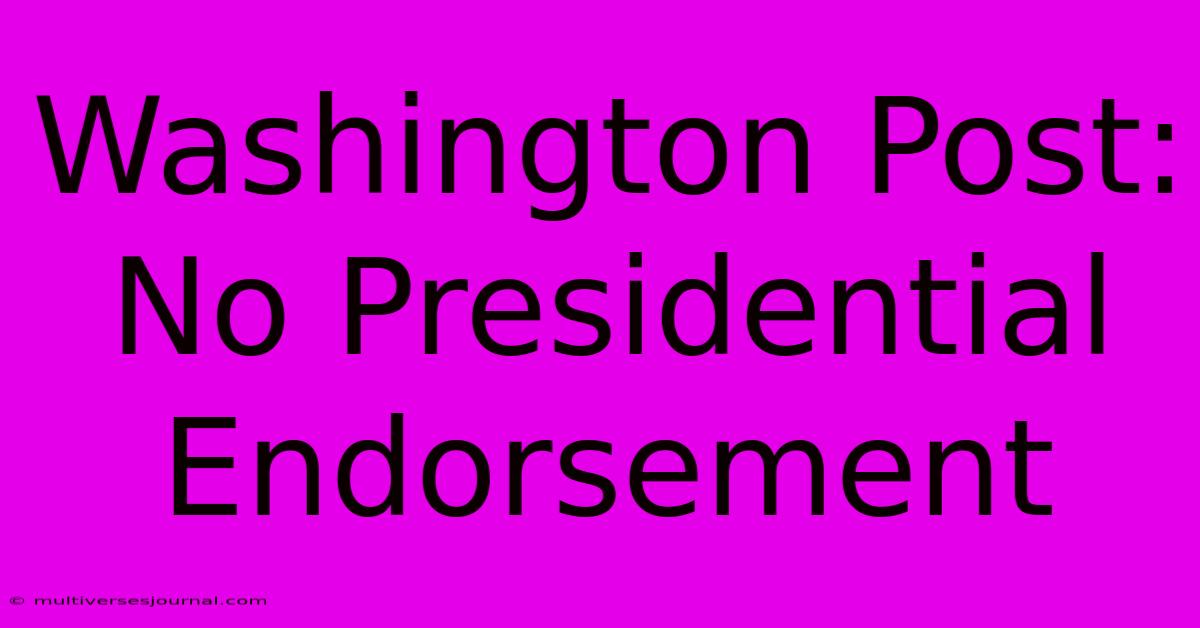Washington Post: No Presidential Endorsement

Discover more detailed and exciting information on our website. Click the link below to start your adventure: Visit Best Website multiversesjournal.com. Don't miss out!
Discover more detailed and exciting information on our website. Click the link below to start your adventure: Visit Best Website mr.cleine.com. Don't miss out!
Table of Contents
The Washington Post's Historic Decision: No Presidential Endorsements
In a move that shook the political landscape, The Washington Post announced in 2020 that it would not endorse a presidential candidate. This decision, unprecedented in the paper's 140-year history, sparked debate and raised questions about the role of media in a democratic society.
A Shift in Editorial Strategy
The Post's decision was driven by a desire to avoid appearing biased and to ensure its coverage remained independent and credible. The paper's editorial board cited the highly polarized political climate and the spread of misinformation as key factors in their decision.
"We believe that our responsibility is to provide our readers with the information they need to make informed decisions about who they support, not to tell them who to vote for," wrote the editorial board.
The Arguments For and Against
The decision sparked a lively debate, with supporters praising the Post for prioritizing neutrality and objectivity. They argued that endorsements could alienate readers and damage the paper's reputation for impartiality.
Critics, however, argued that endorsements are a vital part of the democratic process, providing voters with insights into the candidates and their positions. They argued that the Post's decision was a step away from its role as a watchdog and a voice for the public.
The Impact on American Journalism
The Washington Post's decision sent ripples throughout the American media landscape. Some news organizations, like The New York Times and The Los Angeles Times, have continued to endorse presidential candidates, while others, like The Chicago Tribune, have opted to follow the Post's lead.
The debate over endorsements highlights the changing role of media in a digital age. With the rise of social media and alternative news sources, traditional media outlets are facing increasing pressure to maintain their credibility and relevance.
Beyond the Presidential Election
The Post's decision to abstain from presidential endorsements has implications beyond the 2020 election. It serves as a reminder of the importance of media neutrality and the need for journalists to remain independent and objective.
As the media landscape continues to evolve, the question of whether or not to endorse candidates will remain a topic of debate. The Washington Post's decision, however, serves as a landmark moment, reflecting a growing awareness of the need for balanced and unbiased reporting in the face of a politically charged environment.

Thank you for visiting our website wich cover about Washington Post: No Presidential Endorsement. We hope the information provided has been useful to you. Feel free to contact us if you have any questions or need further assistance. See you next time and dont miss to bookmark.
Thank you for visiting our website wich cover about Washington Post: No Presidential Endorsement. We hope the information provided has been useful to you. Feel free to contact us if you have any questions or need further assistance. See you next time and dont miss to bookmark.
Featured Posts
-
Washington Post Withholds Endorsement In 2024 Race
Oct 26, 2024
-
Mls Season Opener Inter Miami Vs Atlanta United
Oct 26, 2024
-
Yankees World Series Roster Announced In And Out
Oct 26, 2024
-
Phil Lesh Grateful Deads Legendary Bassist
Oct 26, 2024
-
Yankees Vs Dodgers World Series Game 1 Breakdown
Oct 26, 2024
